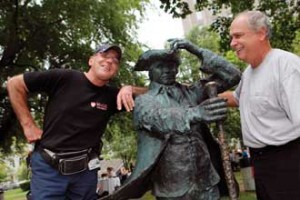
By Neale McDevitt
With a population of some 40,000 students, staff and faculty, McGill would rank 73rd in the 2006 census of largest Canadian cities by population, ahead of such places as Moose Jaw, Valleyfield and Rouyn-Noranda. Add to that retirees and the approximately 200,000 alumni worldwide and we vault to 17th, ahead of cities like Regina, Sherbrooke and Saint John’s, Newfoundland.
With a population that large, it’s easy for members of the McGill community to feel a little isolated outside of their immediate department or faculty.
To help foster a greater sense of unity among McGillians, the Campus Community Committee (CCC) hosted the first-ever Campus Community Kick-Off Breakfast in the Parents Tent on lower campus on Aug. 26. What better way to get to know your neighbour than to break bread together – or, in this case, a blueberry muffin?
“The breakfast provided an opportunity for people from different parts of the campus to interact with friends as well as meet new colleagues who work in areas of the University with which they have little familiarity,” said Prof. Morty Yalovsky of the Desautels Faculty of Management and one of the three co-chairs of the CCC. “It was a wonderful way for all who participated to learn more about the various activities in the University in which they spend so much time.”
Co-sponsored by McGill Food and Dining Services, Development and Alumni Relations, and the CCC, the breakfast was the first in a series of events planned for the fall to bring students, staff and faculty closer together. A trio of Lunch and Learn lectures will give McGillians the opportunity to benefit from McGill experts discussing topical issues. The first such lecture on Sept. 30 will feature Prof. Reuven Brenner, Repap Chair in the Desautels Faculty of Management, who will provide insights and possible approaches to deal with the current economic crisis.
The CCC was formed about a year ago and is co-chaired by Yalovsky (faculty representative); Robyn Wiltshire, Director, Office of the Deputy Provost, Student Life and Learning (staff representative); and SSMU President Ivan Neilson (student representative). As with any undertaking with such a broad scope, one of the first hurdles was achieving consensus. “Because we have reps from all the levels of organization from across the university,” said Neilson, “one of the challenges has been how we craft a message that is appropriate for the entire McGill community and how we reach as many people as possible.”
Neilson believes that while it may be somewhat more difficult to get buy-in from the student body, the initiative is an important one. “We’re starting from the ground up,” he said, “but I think we will be successful provided we deliver the message well. Obviously through various fees, referenda and various things like that, students have shown their support for the University. We’ve seen the need and we’re willing to help. I think [the CCC] just needs to explain properly what it’s trying to achieve.
“I think this will have lasting effects for everyone involved with McGill to finally realize how they interact with the University and how they are part of something bigger.”
From her perspective, Wiltshire sees things a little differently than her fellow co-chair, saying that the CCC will really be building on an already strong foundation. “I think there is a terrific esprit de corps on campus,” she said, “and the breakfast is really the first step in acknowledging that we are a community – staff, students and faculty. It’s our work together that really advances research and scholarship at McGill.”
But that research and scholarship comes with a price tag and the CCC is hoping that fostering goodwill and community spirit will translate into more McGillians being supportive of Campaign McGill. “We work hard and I think that faculty members and staff give a lot to McGill already – that’s what has helped make McGill the great institution that it is,” said Wiltshire. “But the focus of the Community Campaign is really more about participation than the bottom line. It’s not just the size of the gift that counts. It is really significant to be able to tell alumni and potential external donors that a large percentage of our faculty and staff give to the University. Basically to say that people who know it best believe in the institution.”
Yalovsky couldn’t agree more. “We want people to be more involved than just donating. Yes, the gift is important but also having the opportunity to suggest where these funds could best be allocated is equally important,” he said.
“There is no question that many organizations have undergone some serious belt-tightening because of the global economic situation,” continued Yalovsky. “But that doesn’t mean you have to desist from fund-raising. We are confident that members of the McGill Community will participate at whatever levels they can.”
